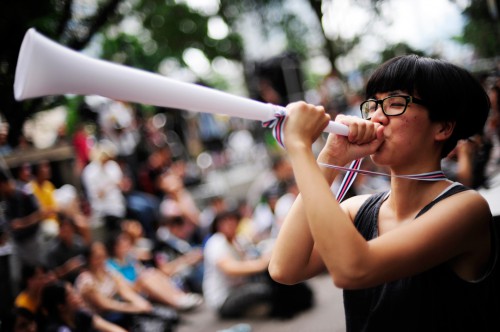A decentralized, yet unified movement. Massive, yet organized and clean. With demonstrations led by young citizens fighting an oppressive rule about as old as they are, the streets of Hong Kong have been overtaken by students demanding for political change since Friday.
Challenging the Chinese Community Party’s reputation of expertly shutting down protests before, masses of citizens have occupied popular highways, government buildings, and social media to take a stance for more democracy.
Unlike the mainland, where the media is obsessively controlled, Hong Kong’s protests in the streets have been able to overcome strategies previously used by President Xi Jinping of China, as reported by The New York Times.
With Xi’s tough reputation of standing against change, it is unclear what changes will be made to stop the demonstrations. If he calls for more force to be used against the people, it could resemble the murders committed in 1989 by protesters who were also fighting for political change. Oppositely, to concede to any changes will damage his reputation and unwillingness to negotiate with protesters and could be interpreted as major signs of success for those in the streets. Consequently, a concession or compromise could add more fuel to the existing turmoil.

Police has used teargas to try to control protesters, according to NYT. Demonstrators have been using umbrellas as shields against the spray and sunshine during the daytime.
Based on the reports of polls conducted by academic institutions, the main age group that is discontented with the government are those in their mid-20s who have recently graduated college and are struggling to find jobs, as reported by NYT. Employers are increasingly hiring professionals from the mainland rather than locally. It is an issue that, presumably, young college students see being a personal problem as their own graduation approaches.
Protesters are asking to be able to elect their own officials without influence of the mainland, known to place their own preferred politicians into power.
There is no clear lead individual or organization, a fact that has made it difficult for the Chinese government to attack the demonstrations without a definite target. However, the same matter could prove to be a weakness as the number of the masses increase and more organization is required.
“The strengths of these protests are that it’s so decentralized, so first of all you can’t crush them through arresting the leaders,” said Maya Wang, a researcher at Human Rights Watch in Hong Kong who has monitored the demonstrations, according to NYT. “The weaknesses are, of course, that there could be confusions and splits as the situation quickly develops. So far it has worked remarkably well, but it might not further along the way.”
The protesters have been cooperating with local police to ensure that emergency vehicles are able to move about the city effectively, although the response times have been slowed down due to the demonstrations, as reported by NYT.
A group of organizers is ensuring the streets remain clean and that people are attending to their hygiene so as to not come across as careless citizens.
“In this protest, we want to show our citizenship and our will to have a democratic government,” said Chan Sau-ching, a 21-year-old medical student, according to NYT. “Although this cleanup is a small thing, it is something that shows the values that all Hong Kong citizens should have.”







